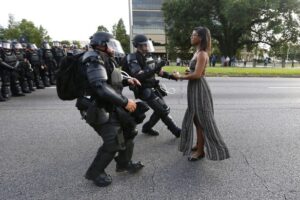Rethinking the Role of Police
Law enforcement scholar David Bayley begins his book, Police for the Future, with what he calls one of the best-kept secrets of modern life: “The police do not prevent crime.”
He points to US studies that show increases in police numbers had virtually no impact on crime rates, something he also observed in Australia, Britain and Canada. In this documentary we rethink policing and ask whether the institution should be abolished altogether.

A demonstrator holds her hands up and kneels in front of police at the Anaheim City Hall, in California. The peaceful protest occurred on June 1, 2020, over the killing of George Floyd by a police officer. (Apu Gomes/AFP via Getty Images)
Listen to Part One here or on CBC Radio.
To say that the police do not prevent crime at all is, of course, an exaggeration. But contrary to decades of cop-show melodrama, police spend only a fraction of their time chasing hardened criminals and shaking down drug cartels.
In 2018, police departments across Canada received 12.8 million calls for service. Between 50% and 80% of them were non-criminal in nature, spanning everything from domestic disputes and traffic accidents to overdoses and mental health crises.

“Police are not out chasing bank robbers and serial killers,” says Alex Vitale, professor of Sociology at Brooklyn College at the City University in New York, and author of The End of Policing. “If we look at what police actually do, day in day out, [and] if we look at the 10 million arrests that police perform (in the U.S.) every year, they’re almost entirely located in the poorest and most vulnerable communities in our society.
“And the purpose of the majority of those arrests is not to produce public safety, as much as it is to manage a set of social problems that threaten the existing political and social arrangements.”

Jonathan Bachman, Reuters
Emergency response alternatives
Geographer and abolitionist Ruth Wilson Gilmore says many cities have fallen victim to “organized abandonment” where social agencies are under-resourced and police are left to pick up the pieces. Sometimes the consequences are disastrous.
Of the 34 people killed by police in Canada in the first 11 months of 2020, at least nine of these fatal incidents began as wellness checks.
A 2018 CBC investigation found that at least 461 people were killed during a police intervention since 2000. In 42% of these cases, there was evidence that the victims had mental health issues.
This finding has amplified calls for alternative ways of responding to social crises.
Toronto has been running a community safety programme in areas at high-risk of criminal behaviour, where police work in collaboration with other agencies. A 2017 report on the programme revealed that while the majority of calls for help were made to police, it was social agencies that now responded to most of them. Police received 66% of calls, but responded to just 3%; whereas more than 80% of those calls were relayed to Social Services, Health, Housing, Children & Youth Services.
“Many people have acknowledged, including police leaders and the government, that the police are currently doing too much, that over time we’ve increasingly asked the police to respond to a host of social problems and social ills,” says Akwasi Owusu-Bempah, a criminologist at the University of Toronto.

Ejaz Ahmed Choudry, 62, suffered from schizophrenia and was fatally shot by police in Mississauga, Ontario. He was one of several Canadians experiencing a mental health crisis when killed by police in 2020. (Submitted by Choudry family)
Rather than de-funding, he advocates “de-tasking”: conducting an audit of police tasks and relieving them of the ones for which they are least equipped or qualified.
“And we can take those jobs, and assign them to other organizations, agencies, institutions, and move the funding with that. That’s not to say there would be no police response to people in mental health crises, but they certainly would not be the primary response. They wouldn’t be the first responder in those instances. They may be there for support.”
Reallocating resources
Across Canada, provinces and cities are re-examining the role of police in society. In the fall of 2020, Halifax’s Board of Police Commissioners appointed community activist and teacher El Jones to create a committee to define defunding and ways funds could be redirected to better serve community needs.

Activist and teacher El Jones has been appointed to create a committee to outline how a proportion of police funding could be redirected to better serve community needs. (Submitted by El Jones)
“We don’t know how to deal with conflict, hold people accountable, and heal,” she says. “Nobody who’s an abolitionist seriously is like, ‘we’ll just get rid of the police. Everything will be fine!’ We haven’t created any kind of other system.. [yet].”
Some countries have already begun to do things differently. Portugal decriminalized drug consumption in 2001 and saw drug-induced deaths plummet — IDEAS has featured a documentary on the Portuguese model. Since then, other countries have followed suit, and shifted addiction issues from a policing priority to a matter of public health.
The legalization of prostitution in Germany has allowed police to focus on traffickers and forced sex work.
Toronto is launching a pilot project where civilians, not police, are sent to non-violent mental health crises.
Each initiative allows police agencies to focus their resources elsewhere — effectively the kind of “de-tasking” that Owusu-Bempah describes.
Alternative agencies could replace police in some cases, and complement them in others. Winnipeg is home to a host of grassroots groups, including OPK (Ogijiita Pimatiswin Kinamatwin), Community 204 and Mama Bear Clan, which carry out street patrols in vulnerable areas.

Members of a women-led volunteer group, the Mama Bear Clan, patrol some of Winnipeg’s toughest streets. (Martha Troian/CBC)
OPK volunteers carry out mental wellness checks and safe walks for women, mediate “street beefs” and help gang members exit gang life safely.
“I’d say 90% of any stressful situation we tend to de-escalate or resolve ourselves,” says long time community activist Mitch Bourbonniere, with OPK. “In about 10% of the cases, it’s beyond us, and we have to call in the police.
“I don’t think we can do away with the police. There are dangerous people out there. But there has to be a lot more involvement with community organizations. Why can’t we work together?”
Seeking meaningful reform
Some police officials say there’s still time for reform. Retired RCMP Chief Superintendent and Associate Professor at Athabasca University, Angela Workman-Stark, points to the work done by New Zealand’s police and its independent oversight body over the past decade, during which public confidence in the police has soared.
“The police had to constantly demonstrate change,” says Workman-Stark. “They had experts come in and evaluate the changes, and those changes were never signed off until external experts said, ‘we see evidence change has been implemented.’ I have never seen that in Canada.”
Emeritus Professor at the School of Law, Birkbeck University of London, Mike Hough says some kind of state institution with the capacity to use coercive force will always be necessary.
“That’s what policing, to my mind, is essentially about, and the use of coercive power is at the core of their mandate,” he says.
“And it’s essential that the use of that power is done democratically, fairly and in respect of human rights.”
Guests in this episode:
Joanne MacIsaac‘s brother Michael was killed by police in Ajax in 2013. With the Innocence Project, she and her family are lobbying the Ontario Government to amend the Police Services Act. She is also lobbying for a national database for police involved deaths.
Kevin Walbyis associate professor of Criminal Justice at the University of Winnipeg.
Patrick Lynch is president of New York’s Police Benevolent Association, the largest municipal police union in the U.S., a post he has held for more than 20 years.
Angela Workman-Stark is associate professor and programme director at Athabasca University in Alberta. She retired from the RCMP as chief Superintendent after 24 years of service in 2016.
Pam Palmateris a lawyer, professor and Chair in Indigenous Governance at Ryerson University. She is the author of Warrior Life: Indigenous Resistance and Resurgence, among other works.
Barbara Perry is director of the Center on Hate, Bias and Extremism at Ontario Tech University, and is co-author with Ryan Scrivens of Right-Wing Extremism in Canada.
El Jones is a teacher, activist and a former Poet Laureate for the city of Halifax. She has been appointed by the city’s Board of Police Commissioners to create a committee that will define defunding and outline how funds could be redirected to better serve community needs.
Akwasi Owusu-Bempah is assistant professor of Sociology at the University of Toronto.
Mark Neocleous is professor of Political Economy at Brunel University, London, and author of several books on policing, including A Critical Theory of Police Power.
?Alex Vitale is professor of Sociology and coordinator of the Policing and Social Justice Project at Brooklyn College at the City University in New York, and author of The End of Policing.
Peter Sandziuk recently retired from the RCMP after 29 years in the force, working in everything from regular patrols to national security and narcotics. He teaches at the School of Justice and Emergency Services at Durham College in Oshawa, Ontario.
Jacques de Maillardis director of the Centre for Sociological Research on Law and Penal Institutions and professor of Political Science at University of Versailles-Saint-Quentin-en-Yvelines just outside of Paris. He’s the author of several books, including Polices Comparées, which compares policing around the world.
Mike Hough is Emeritus Professor at the School of Law, Birkbeck University of London and author of many works on policing, including the book, Good Policing: Trust, Legitimacy and Authority.


